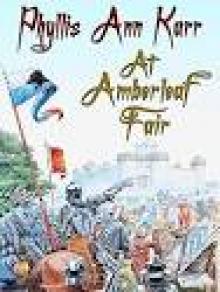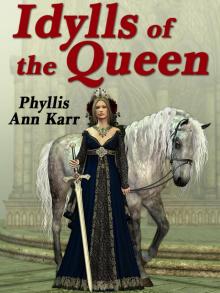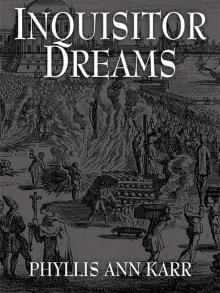- Home
- Phyllis Ann Karr
Inquisitor Dreams Page 15
Inquisitor Dreams Read online
Page 15
“I have guessed what this means. She shows me scenes of the past—you, of the future.”
Her grip loosened, though for a moment only, as she seemed to ponder his statement. “Huh. I’d have called this one the luck of the draw, but you could be right. From your current point of view, anyhow.”
“And she has just lied to me concerning the past. Mine was not the hand that poured El Santon into the Church, and in many other details, also—”
“We do the best we can, considering what we’ve got to work with! If you think you people do any better with your expert consultants and so-called Councils of Faith, just stay here and choose your own nightmare.”
Humbled, he let her lead him along.
The town and its plaza had vanished, and now there was only darkness to the one side of the path. To the other side, the cavern wall showed its paintings more clearly than ever, for in place of lamp or candle, Rosemary carried some strange new lantern of the future, that cast a steady and unflickering radiance in all directions at once from a glasslike bubble at its top. Fewer and fewer animals appeared among the paintings, and more and more outlines of hands, usually lacking one or more of their fingers.
When next he looked, maps had appeared among the hands. Maps of Greece and Rome and the Holy Land…of Italy and Spain…of northern Europe and distant Britain…of the Irish coast at the northwestern edge of the world…then Ocean…Ocean with the far Azores, and then nothing more, nothing but the expanse of waters flowing on one side down the cavern wall and rising on the other side in a great, dark tide engulfing the narrow path below their feet, rising to their knees, their waists, their chests…yet Rosemary strode along ignoring the tide, her light shimmering up greenly through the waves, while against the weight of water Felipe strove to match her pace…lands and rumors of new lands beyond the seas?
But now a last creature came down from the wall—a huge beast, no longer painted, larger than horse or bull—as gigantic, Felipe thought, as the elephants might be—with the bulk of its body in its brown-maned forequarters and great, shaggy, broad-nosed, short-horned head—
“It is the Manticore!” he cried, without knowing why.
She shook her head and grunted, “American bison.”
Manticore or bison, the beast ploughed past them, parting the waters in a great swathe that spread until Felipe found the earth once again firm and dry beneath his feet.
A large fire burned in the center of the space, several smaller fires around its circumference. The ceiling, too, had fallen, so that it seemed now to be little more than a man’s height above Felipe’s head, and ribbed with thin beams. From these beams, here and there about the central fire, depended several nearly naked young men, swaying freely from ropes attached to skewers thrust through the flesh of either chest or back shoulders. Chest or back, the strips of muscle and sinew, following the skewers up away from the weight of the suspended body, had drawn out to incredible length. Half a dozen wildly contorting figures surrounded each sufferer, mocking and jeering, prodding with shafts, even driving into weak arms and legs further skewers, from which they hung additional weights.
“What form of terrible strappado is this?” the inquisitor exclaimed. “God and the Virgin! You have brought me into Hell! You are showing me the Inferno itself!”
She shook her head. “Coming of age, early Native American style.”
“But…it is such torture as even Fray Junípero would blush to demand!”
“Sure about that, are you? Maybe you should check with the victims. These lads all want it. They’re going to take great pride in the scars. Badges of manhood.”
He made himself look again at the unfortunates, this time observing the passivity with which they hung…one might at first suppose some of them already dead. “Are they drunk into stupor?”
“Three or four days of fasting, sweat lodge, and sleep deprivation. Enough to make most of us Vanillas see visions even without the climactic nonsense.”
Don Felipe pondered. “There are those who say that the innocent welcome torture as the final means to prove their innocence, and the guilty who refuse to confess welcome it as their means of winning free despite all weight of evidence and witness.”
“Amazing, the excuses different societies find for hurting and getting hurt. Watch out!”
The great beast—bison or manticore—reappeared, lunging back through the cavern to butt its huge shaggy head against one of the dangling bodies. The victim jerked and stiffened. His human tormentors stood back, one of them pointing upward. The beast tossed its head as if to ravage the sufferer with its horns.
The thongs of flesh, already grotesque in their tortured length, strained yet further. With a wet wrenching that Felipe seemed to feel above his own left nipple, one stretch of skin and sinew pulled apart. For the space of half a Gloria, the victim dangled by a single strand before it, too, parted, letting him drop crumpled to the hard-packed earth.
The manticore-bison snuffled at him for a matter of heartbeats, then trampled him beneath its hooves in making its departure. The painted humans clapped hands to one anothers’ shoulders and melted away, perhaps to join the demonic groups around other sufferers. Don Felipe found his hands pressed tightly to his own chest.
“Don’t break your heart for him,” Rosemary said dryly. “He just had a Great Vision. The greatest. It’s all over now but the chopping.”
“And he wished for this? They all of them wish it?”
“The way martyrs wish it.”
“No!” Don Felipe shook his head. “Never tell me the holy martyrs desire their pangs! It would rob them of meaning.”
“Huh! What about your flagellants?”
“All the value—all the heroism—of their sufferings lies in the fact that they are sufferings. That which is desired cannot be suffering, or there is no meaning in the word.”
She snorted again. “Don’t tell me that a darn lot of your so-called martyrs didn’t goad their so-called persecutors into doing them in!”
“If suffering were their goal, they would have sought Hell rather than Heaven. My ancestress Raymonde did not seek damnation!”
“Our ancestress,” Rosemary replied. “Are you saying that Raymonde found salvation in spite or hersef, or admitting that she counts as a holy martyr?” While he hesitated wordlessly, she went on, “Besides, I never said all of them goaded their persecutors. Though the ones who did, didn’t make things any easier for the ones who didn’t.”
“God knows His own,” Don Felipe said at last. “Out of all nations and peoples.”
“Righteous minds!” she said in disgust, less as if answering him than as if following her own thoughts. “If you call them ‘holy martyrs,’ you say they’ve won Heaven with their sufferings, and if you call them ‘criminals’ and ‘heretics,’ you justify torturing them to death as ‘giving them a wholesome foretaste of hell.’”
“In the hope that it may bring them to repent even at the eleventh hour and save their souls.”
The young man who had fallen to the ground began to prise himself up to his hands and knees. He moved slowly and heavily, as though under great weights, yet he shone with the radiance of an aureole.
“It is—” Don Felipe blinked. “But it is El Santon!”
As if continuing their argument without interruption, Rosemary queried, “The way you save their consciences by torturing confessions out of them?”
“But Juan Calamocha has never sought to suffer! He confessed at the first degree—”
“In my day, if people want this kind of experience, they usually have to pay for it in special brothels.”
“You must have many criminals walking free, in your day.”
“We still manage to cage up our share of innocent parties,” Rosemary replied with unmistakable bitterness.
“But…” Puzzlement squeezed his brain. “You condemn persons without ratified confessions from their own mouths?”
She made her curious grunt of affirmation. “We don
’t need confessions. We can get ‘Guilty’ verdicts with circumstantial evidence and biased juries. Or vice versa.”
It seemed that the bison-manticore had returned, this time thundering through or over Felipe himself with the shock of Rosemary’s last revelation. Indeed, indeed, the farther times unrolled from the Age of Gold, the worse history became! And yet…and yet…when had been the Age of Gold? Certainly not in the days of Abraham and Moses, or there would have been no need for Covenant or Promise…but not in Christ’s own day, either, for was He not crucified for the sins of His executioners—not only all the rest of humanity, but they who with their own hands actually fashioned and raised the Cross, as well! Nor yet in whatever pre-Adamite society Albigensian and Pagan had brought him to glimpse in this dream, for as the thunder of the great beast passed once again, leaving him to his surprise still on his feet, he saw that the young sufferer—El Santon or not—had crawled to a painted man who sat crosslegged beating a drum. The sufferer stretched one hand out upon a rock at the drum-beater’s knee, extending the middle finger. One hand continuing to beat his drum, the painted man picked up a stone blade and severed the finger with a thud that woke the sleeper.
For some moments, he lay awake listening for a repetition of the strange noise and wondering why he had dreamed of shadowy hands with one or two fingers folded down out of sight.
Chapter 15
The Canon of Eymstadt
This latest Act of Faith, Don Felipe felt, had cost him more, almost, than it had the official sufferers and penitents. Three afternoons later, doubts and fears still chased one another through his soul, with far greater disturbance to his siesta than the burning crimson flashes which clouds chasing one another across the face of the sun marked on his closed eyelids.
Ah, good father, dear lady mother, beloved sister Serafina and all the rest of you, my family, my family…did I do well in letting the chief of your murderers walk free, when crushing him would have required no more of me than allowing my confrere to have his way? But I am a priest doubly tainted…trebly, in that my own sin, so much greater than that of any heretic whom we sentence, lies concealed in the deepest, most secret pit of conscience…
“Lord, my lord!” came Gubbio’s voice. “Still snoozing? The market has been abustle this past hour.”
Opening his eyes, Don Felipe regarded the Italian. “Surely, Gubbio, you exaggerate.”
“Your Holiness thinks so? Be sure I do not exaggerate when I tell you I bought us this for the price of a cabbage.” Gubbio dropped into his master’s lap a leaf-wrapped lump, the size of a man’s fist, of that Moorish confection Felipe had loved since boyhood but tasted more and more rarely as the years went on.
Felipe cocked a brow at his servant. “From the same market as yesterday’s dinner? Gubbio, my Gubbio, I rejoice that I am not your confessor!”
“Rejoice at whatever you please! That market shows greater charity than our fellow Christians in trading with the servant of a servant of the Holy Inquisition, and not even our longest-faced brother questions the beef and mutton he deigns to eat when not fasting, as long as it is tender enough and sauced with sufficient bacon to prove its piety. So everyone is well pleased, from market to table, and if it still naggles at your reverend conscience, here is a trifle to distract your Sanctity.” Producing a letter from his doublet, the Italian touched it quickly to his head before dropping it into his master’s lap almost on top of the sweetmeat.
It bore the seal of Rome.
“I am sure,” Don Felipe said, laying it down again on his lap in hopes that his servant would not see the slight trembling of his hand, “that the bearer did not simply chance upon you there in the market.”
“And if he had? Who should trust one another better than a pair of Italians in a foreign land?” Grinning, Gubbio shook his head. “Your Generosity still being at siesta, our pious servant of the Holy See decided to trust me, with my certain privileges, to bring him back whatever reward you see fit to offer him for his dangers and inconveniences.”
“Tell him,” the priest replied carefully, “that I shall reward him generously, but all in one lump sum, tomorrow. This message will beyond doubt require an immediate reply. Now go and see to the man’s feeding and lodging.”
“Fed, he is already.” Gubbio cast another look at his master, saw that Don Felipe was not about to open the missive in his presence, and yielded with grudging grace. “We will see to his bed for the next night or two.”
Felipe closed his eyes and sat back, as if the epistle waiting in his lap were a less important thing than his broken siesta. Not until he had heard Gubbio’s footfalls safely retreat did he venture another look.
In truth, this letter was anticipated—long awaited in something between eagerness and trepidation. God willing, it might contain the answer to Felipe’s request of 1492.
Anno Domini 1492. That ill-fated year—although as a good Catholic Spaniard Felipe de Alhama de Granada must hold locked within his own breast, alongside the secrets of his great sin and his ancient hatred of the murderer Manuel Urtigo, his true emotions at the fall of Karnattah to their Catholic majesties of Aragon and Castile and at those same majesties’ final pious expulsion of every unbaptized Jew from all their domains.
Like a sign from God to brighten that dark year with its long, doleful processions of Abraham’s children filing to the seaports at the end of July, Don Felipe’s old patron Cardinal Borja had been elected to the papal throne. Among his earliest acts had been the welcoming of all such rejected Spanish Jews as chose to make Rome their refuge—among them, Felipe dared pray, Gamito.
In his own congratulatory missive to the new pope, Don Felipe had reminded Alexander VI, as Cardinal Borja now was, of his own efforts in the field where his patron had placed him, by pledging to continue them. At the same time, he had hinted his readiness to undertake some farther-ranging service, some errand to France, perhaps, or even to the ever-restive and troublesome Germany, which might enable him to offer further proof of his loyalty and also increase his knowledge, thus improving his labors at home.
(And also, though this he hardly dared subvocalize even in his own heart, provide him the chance to discharge his poor conscience in Confession to some obscure and anonymous parish priest, far from both Spain and Rome, and preferably having more bastards at his knee than Latin in his head.)
There had, of course, been much to occupy the new pope during the first five years of his reign—wars and rumors of wars; the French king’s attempted invasion of Italy; the need for papal arbritration of property rights in the newly found lands beyond the ocean… Yet now, at last, his holiness had remembered one relatively obscure yet loyal satellite helping bind the unruly Spanish church in allegiance to Rome.
Remembered him to grant his request at once, or to bid him continue his service in patience and obedience? Anxiety casting out dread, Felipe finally broke the seal.
The pope’s dictated words were formal, yet to his relief Don Felipe drew from them a sense that his patron had forgotten neither him nor the conversation that had determined his life’s course, all those years ago, by placing him here in Aragon. In words doubtless duplicated, with small variations, to satellite after satellite, his holiness said in effect, “Well done, thou good and faithful servant: continue thy loyal labors in the field wherein I have placed thee.” But after this, in words that seemed tailored to Don Felipe alone, the pope added that a certain mendicant canon, formerly belonging to the Augustinian house of Eymstadt of the Congregation of Windesham, had lately brought to the papal attention a matter of ancient abuse and imposition, involving blatant superstition and quite possibly simony, long practiced upon the simple in a diocese of Ireland: namely, this canon claimed that the Purgatory of Saint Patrick was no more than a fraud. Considering the ancient fame of the site, Alexander wished to make some further inquiry before ordering it to be shut down; and, on Saint Benedict’s admirable principle that a change of labor was as good as a rest, he proposed sending his goo
d and loyal servant Felipe de Nuestra Señora del Pilar de Agapida de Aragon as legate to accompany the said mendicant canon back from Rome to Ireland, there to serve as the pope’s own eyes and ears in the matter of this so-called Purgatory.
The so-called Purgatory of Saint Patrick, long renowned as a sure place of visions…if not, indeed, of actual visitation to that world beyond the grave! How many travelers’ accounts had been written of it through the centuries? True testaments, or fabulous odyssies akin to those of Dante and—the inquisitor smiled, remembering—of young “San Juan de Calamocha”? Difficult, sometimes, to say for sure. And what of the middle ground?—pilgrims whom that site at the very edge of the world had inspired with dreams of a nature so luminously visionary that they afterward wrote them down in the sincere if misguided belief of their actuality.
Well! Ireland might no longer lie at the very edge of the known world, but among its simple priests Felipe de Granada y Aragon could surely find one sufficiently obscure and unlettered to serve the purpose of his spiritual salvation.
* * * *
Two decades and three changes of pope seemed to have made less difference in the Eternal City than Felipe would have expected; almost, he felt, he could still name some of the cows at their placid grazing, recognize certain of the scavenging swine by their markings. He felt the days of his youth heavy about him here, clinging close as a woolen cloak to his shoulders, while at the same time such changes as he saw served to encrust that cloak with the stiff weight of his own encroaching middle age. He would not again see forty! What had become of all those high spirits and higher ideals of his youth? Our Lord’s solemnly ordained priest-knight—stained with such mortal sin as must have cost him his Lady Morayma’s favor forever if she had not been lost to him already—now wasting his years away with the tedious minutiae of combing other souls’ lives for hidden heresies! And to what use or purpose? Saving a few poor, sinful bodies here and there from the zealous excesses of a Fray Junípero or the harsh judgment of the secular arm which saw heresy as treason not only against Heaven but against the state as well…and all the while remembering, with every decision rendered and every punishment decided upon, the condition of his own soul before the judgment seat of God. When had Ihesu ever addressed mere heretics as “whited sepulchers”?

 The Gallows in the Greenwood
The Gallows in the Greenwood At Amberleaf Fair
At Amberleaf Fair Frostflower and Thorn
Frostflower and Thorn The Fanciers & Realizers MEGAPACK
The Fanciers & Realizers MEGAPACK All But a Pleasure
All But a Pleasure The Idylls of the Queen
The Idylls of the Queen Frostflower and Windbourne (Frostflower & Thorn)
Frostflower and Windbourne (Frostflower & Thorn) Inquisitor Dreams
Inquisitor Dreams